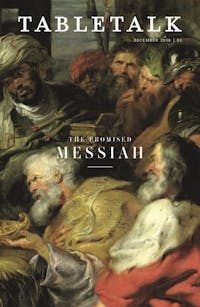
Request your free, three-month trial to Tabletalk magazine. You’ll receive the print issue monthly and gain immediate digital access to decades of archives. This trial is risk-free. No credit card required.
Try Tabletalk NowAlready receive Tabletalk magazine every month?
Verify your email address to gain unlimited access.
A dear friend took my wife and me to dinner last week. We went to an expensive restaurant that served a fabulous meal. But that is not why he chose it. Rather, it was a place particularly suited for conversation. There was no loud music blaring, no televisions with ESPN highlights and scrolling baseball scores. Undisturbed, we dined and talked for nearly five hours, and it was a delightful time.
Reflecting later on the experience, I was struck by how the conditions for fine dining can differ so much from our expectations for public worship. My own congregation promotes its worship as simple, avoiding the worship bands, big screens, and other common features of many churches today. But any pride that I may be tempted to feel is dispelled when I read how the Westminster Assembly, in its Directory for Public Worship, prescribed the proper way to approach worship:
The people are wholly to attend upon [worship], forbearing to read anything, except what the minister is then reading or citing; and abstaining much more from all private whisperings, conferences, salutations, or doing reverence to any person present, or coming in; as also from all gazing, sleeping, and other indecent behavior, which may disturb the minister or people, or hinder themselves or others in the service of God.
Whispering, gazing, sleeping—if I am honest, I must plead guilty to these and other “indecent behaviors” that hinder my worship and disturb others. The Westminster Larger Catechism reinforces a demand for reverent attention in worship. Pew sitters are to
attend upon [the Word read and preached] with diligence, preparation, and prayer; examine what they hear by the Scriptures; receive the truth with faith, love, meekness, and readiness of mind, as the Word of God; meditate, and confer of it; hide it in their hearts, and bring forth the fruit of it in their lives. (Q&A 160)
An unattainably high bar, we are liable to think. But the Westminster divines wanted us to understand that it is largely through public worship that God meets with His people. These standards serve to deliver God’s promise that the Word and the sacraments are effectual to the elect for salvation. Reformed worship is about guarding the pulpit and fencing the table. The Westminster Assembly goes even further and asks, How are we to eliminate the distractions that beset us in worship?
For one, we might rethink the logic of “seeker-sensitive worship.” We should be concerned about visitors in our worship, but our concern for them should not prompt us to maximize their comfort and pleasure over the worship of God.
Second, focused attention warrants a measure of withdrawal in order to properly reflect on the things of God. This requires that we filter out some senses that might detract from our attending to the Word, such as being distracted by coffee or looking around. Even our Bibles themselves require caution; the Westminster Directory warns against Bible reading during worship if it extends beyond the text of the sermon.
What about reading from the Bible app on our smartphones? Caution is again needed. Our phones are a pathway to many distractions—there is texting and tweeting and much more. Even if we think we are disciplined enough to exercise restraint, we should consider how we are encouraging others who lack our self-control. (Remember, we are engaged in public worship.)
Single-minded attention is strange to us, even in worship, because we take pride in our ability to navigate our busyness with speed and nimbleness. In a multitasking world, Marva Dawn rightly concedes that worship is a “royal waste of time” because we are focused on something that our frenetic culture dismisses as inefficient. And yet, neuroscientists have come to the consensus that multitasking is a myth. We accomplish far less when we juggle several tasks than when we focus on one thing at a time. What is worse, our digitally enhanced distractions are becoming addictive: our brains crave constant stimulation and instant gratification. How ironic, then, that we program our phones with “alerts” and “notifications” for so-called breaking news when they have the effect of diminishing our alertness, prompting thoughtlessness and negligence to the task at hand. In sum, the spirit of our age is inimical to the careful and sustained attention that public worship demands.
Is it possible anymore to resist the persistent distractions of our digital age that obscure the message of the gospel? We need not abandon such a hope. Traditional church practices refocus our attention on the gospel and enable our worship of the transcendent God. Public worship and Sabbath keeping are the most culturally disruptive witnesses for Christians to practice. On a day designed for the soul to feast, we must resist habits that distract us and others. I am trying to go completely offline during the day. It is proving to be a great struggle, but I trust that it will awaken me from the stupor that can come from living in a culture that prizes distraction.
The stakes may be higher than we think. As distraction dulls our senses, it can lead even believers to indifference about heavenly matters. The book of Hebrews (which many commentators believe was originally a sermon) speaks powerfully to our digital age when it warns, “We must pay much closer attention to what we have heard, lest we drift away from it” (Heb. 2:1).
If we can carve out undistracted time and space for a fine meal, why not also for public worship? After all, the conversation is even better, and so is the food.
